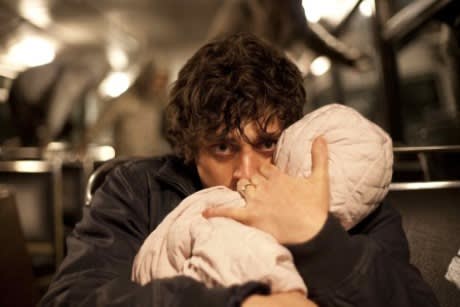In trajectory and execution, Ciaran Foy's relentlessly intense ode to urban paranoia, Citadel, is much like a nightmare in its refusal to ground itself in a relatable, or safe, framework for the duration of its runtime. Even the quieter moments away from the central chaos and threat are staged with unease and an unnerving unpredictability, adding visceral viability to a story that is as irreverent and socially conscious as it is psychological and character driven.
This well-rendered unease is apparently from the opening when soon-to-be parent Tommy (Aneurin Barnard) watches his pregnant wife get attacked by hooded youths from within a malfunctioning elevator. Pulling a needle from her stomach, his ensuing panic and disbelief ultimately defines him for months to come when he's left alone with a baby after his wife succumbs to an "undetermined infection."
Agoraphobic and riddled with self-doubt about parental abilities, Tommy starts seeing hooded youths outside of his window and eventually inside his home. And because Foy avoids establishing a separate style for reality and inner psychological environment, we're never sure if the constant attacks are paranoid delusions or an external threat. While his nurse and potential love interest (Wunmi Mosaku) believes his fear is irrational, a foul-mouthed priest (James Cosmo) asserts that these slum-dwelling youths are actually infected with a virus and will stop at nothing to steal Tommy's baby.
Astutely capturing the nature of victimhood as juxtaposed with nascent parental anxieties, Tommy's character arc of controlling fear and escaping the cycle of passivity is in itself a driving force. But beyond this, there's the added sociological element of generational class system repetition, noting that the infection these youths actually have is that of a morally abject upbringing sure to define them as lifelong predators, looking for weaker targets like Tommy.
In such, the parental subtext proves circular as our protagonist makes literal the metaphor of stealing back his child from the confines of a lower class fate. Here, needles and infections mirror the drug-addled and grim futures of erratic, dejected youths, just as Tommy's eventual quest to rescue his son from their clutches—and their cyclic social deprivation—works as a satisfying and cathartic (but politically incorrect) bit of caustic honesty.
It's rare for a film to capture visceral intensity, psychological complexity or cultural relevance with much lasting aplomb. But in the case of Citadel, Ciaran Foy has scored a hat trick by smartly interweaving all three elements into a riveting, low key work of greatness.
(Mongrel Media)This well-rendered unease is apparently from the opening when soon-to-be parent Tommy (Aneurin Barnard) watches his pregnant wife get attacked by hooded youths from within a malfunctioning elevator. Pulling a needle from her stomach, his ensuing panic and disbelief ultimately defines him for months to come when he's left alone with a baby after his wife succumbs to an "undetermined infection."
Agoraphobic and riddled with self-doubt about parental abilities, Tommy starts seeing hooded youths outside of his window and eventually inside his home. And because Foy avoids establishing a separate style for reality and inner psychological environment, we're never sure if the constant attacks are paranoid delusions or an external threat. While his nurse and potential love interest (Wunmi Mosaku) believes his fear is irrational, a foul-mouthed priest (James Cosmo) asserts that these slum-dwelling youths are actually infected with a virus and will stop at nothing to steal Tommy's baby.
Astutely capturing the nature of victimhood as juxtaposed with nascent parental anxieties, Tommy's character arc of controlling fear and escaping the cycle of passivity is in itself a driving force. But beyond this, there's the added sociological element of generational class system repetition, noting that the infection these youths actually have is that of a morally abject upbringing sure to define them as lifelong predators, looking for weaker targets like Tommy.
In such, the parental subtext proves circular as our protagonist makes literal the metaphor of stealing back his child from the confines of a lower class fate. Here, needles and infections mirror the drug-addled and grim futures of erratic, dejected youths, just as Tommy's eventual quest to rescue his son from their clutches—and their cyclic social deprivation—works as a satisfying and cathartic (but politically incorrect) bit of caustic honesty.
It's rare for a film to capture visceral intensity, psychological complexity or cultural relevance with much lasting aplomb. But in the case of Citadel, Ciaran Foy has scored a hat trick by smartly interweaving all three elements into a riveting, low key work of greatness.




